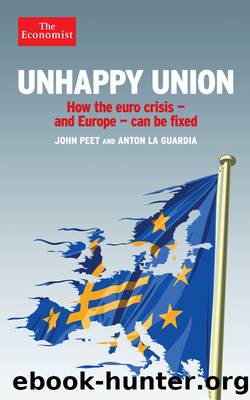Unhappy Union by John Peet

Author:John Peet
Language: eng
Format: epub
Publisher: PublicAffairs
Country-club rules
The answer is to be found in the shifting balance of power among EU countries, which is perhaps where the greatest impact of the euro crisis can be seen. The underlying fiction of the European project from the beginning was that member countries were broadly equal. Most institutions worked on the basis of one representative per country, although until the Nice treaty big countries were entitled to two commissioners. Admittedly, qualified-majority voting in the Council gave more weight to big than to small countries, but the system was still biased towards the small â and the most important decisions were almost always taken unanimously. Seats in the Parliament do reflect population size, but even there small countries have tended to be overrepresented (Malta has proportionately five times as many MEPs as Germany).
Yet despite all this, the notion of equality within the EU remains largely false. In practice, two countries have always acted as the principal engine in the European motor: France and Germany. Italy, the other big country in the original six, has never been able to match the clout of these two, partly because for many years its political system led to frequent elections and innumerable changes of prime minister, and partly because, after a long period of catch-up growth that lasted into the 1980s, its economic performance has been so dismal. Although the Netherlands has occasionally dissented, and has also in recent years turned noticeably more sceptical towards the European institutions, the Benelux trio have generally been willing to go along with Franco-German leadership. It has been hard for any newcomers, including largish countries such as the UK, Spain and Poland, to break in.
In the early years of the European project, especially after the Elysée treaty of 1963 that cemented links between the two countries, it was France that saw itself as in the lead politically, leaving the then West Germany to pay most of the bills. Indeed, this was one reason the French were reluctant to let the UK join in the early 1960s: in the words of the French foreign minister at the time, they did not want another cock on the dunghill. The EU institutions, including commissioners and their cabinets, were largely designed on French lines. The Commissionâs first secretary-general was French. The common agricultural policy, the common fisheries policy, the customs union and the budget were all drawn up in many ways to the benefit of the French at the expense of the Germans (and, sotto voce, of the British when they were eventually let into the club in 1973).
By then the relationship across the Rhine had become more one of equals, as (West) German economic power asserted itself. The response of successive French presidents and German chancellors was to forge still closer bilateral links, even though they often came from opposing political families: Valéry Giscard dâEstaing with Helmut Schmidt, François Mitterrand with Helmut Kohl, Jacques Chirac with Gerhard Schröder. It became understood that, if France and Germany could agree on something, so (most of the time) could the rest.
Download
This site does not store any files on its server. We only index and link to content provided by other sites. Please contact the content providers to delete copyright contents if any and email us, we'll remove relevant links or contents immediately.
International Integration of the Brazilian Economy by Elias C. Grivoyannis(107080)
The Radium Girls by Kate Moore(12007)
Turbulence by E. J. Noyes(8013)
Nudge - Improving Decisions about Health, Wealth, and Happiness by Thaler Sunstein(7684)
The Black Swan by Nassim Nicholas Taleb(7095)
Rich Dad Poor Dad by Robert T. Kiyosaki(6586)
Pioneering Portfolio Management by David F. Swensen(6278)
Man-made Catastrophes and Risk Information Concealment by Dmitry Chernov & Didier Sornette(5992)
Zero to One by Peter Thiel(5774)
Secrecy World by Jake Bernstein(4733)
Millionaire: The Philanderer, Gambler, and Duelist Who Invented Modern Finance by Janet Gleeson(4455)
The Age of Surveillance Capitalism by Shoshana Zuboff(4272)
Skin in the Game by Nassim Nicholas Taleb(4229)
The Money Culture by Michael Lewis(4182)
Bullshit Jobs by David Graeber(4170)
Skin in the Game: Hidden Asymmetries in Daily Life by Nassim Nicholas Taleb(3983)
The Dhandho Investor by Mohnish Pabrai(3747)
The Wisdom of Finance by Mihir Desai(3724)
Blockchain Basics by Daniel Drescher(3571)
